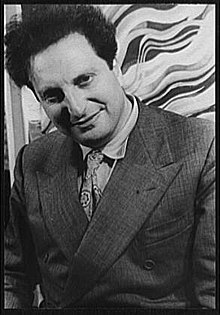Carlo Levi
| Carlo Levi | |
|---|---|

Carlo Levi in 1947
(portrait by Carl Van Vechten) |
|
| Born |
November 29, 1902 Turin, Italy |
| Died | January 4, 1975 (aged 72) Rome, Italy |
| Nationality | Italian |
| Education | Self taught, University of Turin (for doctorate) |
| Known for | Painting, Literature, Medicine |
| Notable work | Gli amanti (The Lovers) (1955) |
| Movement | Contemporary |
| Awards | Senator of the Italian Republic |
| Patron(s) | Felice Casorati |
Dr. Carlo Levi (Italian pronunciation: [ˈkarlo ˈlɛːvi]) (November 29, 1902 – January 4, 1975) was an Italian-Jewish painter, writer, activist, anti-fascist, and doctor.
He is best known for his book Cristo si è fermato a Eboli (Christ Stopped at Eboli), published in 1945, a memoir of his time spent in exile in Lucania, Italy, after being arrested in connection with his political activism. In 1979, the book became the basis of a movie of the same name, directed by Francesco Rosi. Lucania, now called Basilicata, was historically one of the poorest and most backward regions of the impoverished Italian south. Levi's lucid, non-ideological and sympathetic description of the daily hardships experienced by the local peasants helped to propel the "Problem of the South" into national discourse after the end of World War II.
Levi was born in Turin, Piedmont, to wealthy Jewish physician Ercole Levi and Annetta Treves, the sister of Claudio Treves, an important socialist leader in Italy. Levi graduated from high school (Liceo Alfieri) in 1917. Upon graduation, Levi attended the University of Turin, where he studied medicine and, in 1924, graduated with high marks. While at university, Levi had become friends with Piero Gobetti who sparked Levi's interests in political activism that would continue throughout his life. Soon after graduation from the University of Turin, Levi exhibited some of his works at the XIV Venice Biennale.
Levi never completely abandoned his medical studies and served as assistant to Prof. Micheli at the University of Turin's Clinic from 1924 to 1928, working on research involving hepatopathy and diseases of bile tract. From 1924 to 1928, Levi continued his specialization studies in Paris with Professor Bourguignon among others, although by 1927 Levi had decided to dedicate his life to painting. Levi's early time in Paris, as a painter and as a student of medicine, brought him into contact with many notable personalities of the 20th century, including Sergei Prokofiev, Igor Stravinsky, Alberto Moravia, Giorgio de Chirico, and others. Levi lived almost exclusively in Paris from 1932 to 1934 and even attended the funeral in 1933 of his uncle (his mother's brother), Claudio Treves.
...
Wikipedia
